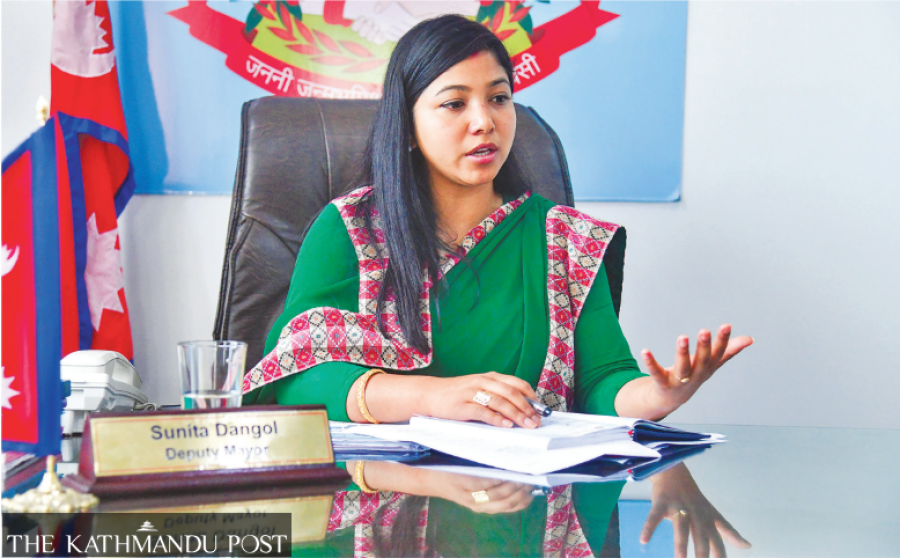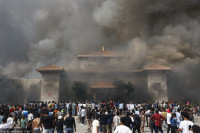Kathmandu
‘We are here to serve the people regardless of our political beliefs’
Sunita Dangol, newly elected deputy mayor of Kathmandu, talks about challenges to active participation of women in politics, introduction of e-governance to control corruption and her willingness to work in coordination with the mayor.
Anup Ojha
In the din of Balen Shah’s victory as an independent candidate to claim the Kathmandu Metropolitan City, yet another feat by a young woman got largely ignored. Sunita Dangol, 29, from the CPN-UML has become the deputy mayor of Kathmandu. She secured 68,612 votes to defeat her opponent Rameshwar Shrestha of the CPN (Unified Socialist) who garnered 23,806 votes.
Dangol has many feathers in her cap—from winning Miss Newa crown in 2011 to becoming a fierce advocate of Nepal Bhasa. During the Covid-19 pandemic, Dangol was well-known for releasing one-minute Nepal Bhasa tutorials on social media. She has worked on TV and radio as a host and is also an accomplished emcee.
Dangol spoke to the Post’s Anup Ojha about her election experience and her plans to deliver on her commitments and overcome challenges that may come as the deputy mayor.
You are the deputy mayor of the country’s largest metropolitan city and one of the youngest elected representatives to assume such a high post. How do you feel?
I am the youngest in our team. But age does not determine maturity. When it comes to work, age is just a number and being young has given me the opportunity to be the voice of my generation and older generations.
To be honest I feel more responsible and committed towards my work. My success has become an inspiration for many youngsters and shown them that there is space for young people in politics. When I was growing up, we would look at successful Nepalis abroad and aspire to become like them. But for this generation of young people, my victory shows that there is scope in Nepal itself, even when it comes to politics.
You have experience in various fields. From being Miss Newa to working in the media and also contributing to promote the Ranjana script, you have done a lot for someone so young. How will you translate those experiences in your new role as deputy mayor?
Our elders would say that whatever experiences you have in life won’t go in vain. This is true in my case. I have worked in various fields and have had diverse interests. I have friends who have been working towards one goal throughout their lives either because of parental influence or out of their own accord. But in my case, it’s been different. I was interested in several things and was active in extra-curricular activities in school. I was also interested in my studies and was a topper in my batch at Laxmi Shikshya Sadan in Teku. Then I went on to participate in Miss Newa 2011 and won. I also worked in the media and then started focussing on Nepal Bhasa and its preservation.
I will now make use of all of these experiences and put them into practice in my work as deputy mayor. I have already announced my plan to set up ‘women’s cells’ in all 32 wards of the metropolis to address problems faced by women. Women ward members will be leading these cells because only a woman can better understand another woman’s problems. Cases of rape and domestic violence will be addressed from these cells since it’s difficult for a sexual assault survivor to approach the police directly. Ward members are the most trusted local faces. However, we will select members for the committee on June 7 and begin our work.
As deputy mayor, I am the chairperson of the City’s judiciary committee, inspection committee and the revenue advisory committee. My priority is to make these committees more impactful and result-oriented. We will be taking a holistic approach to development and not focus only on physical infrastructure development. We will also focus on art, crafts and other socio-cultural aspects of the City. Our major priority is to address the solid waste management issue which our mayor, Balendra Shah, has already announced.
Out of the 32 new elected ward chairs of the KMC, you are the only female representative. What challenges do you personally feel?
I am the only female on the city board. At the first meeting of the board, I was the only female member but that didn’t bother me because I am an elected representative and people have trust in me.
If you look at earlier local elections of 2017, Kathmandu Metropolitan City had just one female ward chair, Shobha Sapkota, in ward-14. I was expecting more elected women representatives this time, but sadly that didn’t happen.
The main hurdles to active participation of women in politics are lack of education and financial dependency on male members of the family. We can expect more participation of women only when women are educated and financially independent. But our society wants to keep women in a ‘comfort zone,’ and does not believe that women can make good political leaders. Our society accepts a male leader easily and also attaches the honorific ‘sir’ immediately when talking to them. But when it comes to female leaders, they resort to calling us ‘didi’ or ‘bahini’ and hesitate to give us the due credit and respect.
You are a CPN-UML candidate and Mayor Balen Shah is an independent candidate. How do you plan to work together?
It doesn't matter which party one belongs to, we are here to serve the people. It’s all about teamwork. The KMC is the country’s biggest and most important metropolitan city so more than looking at an individual's success, we are and will strive for institutional success.
Keeping the three C’s—cooperation, collaboration and co-existence—in mind, I am committed to working with the mayor for the development and prosperity of Kathmandu.
How often do you have meetings with Mayor Shah? How does he respond to your queries or suggestions?
We have been holding meetings quite often. On Friday morning, we visited Sisdole to take stock of the waste management problem. The mayor is a positive person and very cooperative. I don’t feel like we come from different political parties or ideologies because we have the same goal—to serve the people and make Kathmandu a liveable city.
The previous mayor of Kathmandu was from the CPN UML and the deputy mayor from the Nepali Congress, and they were famously at odds. Many say they wasted their five years just blaming each other. What is your take from them?
Our past failures and wrong practices teach us lessons for the future. Where there is collaboration and respect for co-existence, there is no conflict. The best lesson we have learnt from the past elected representatives is that we have to solve all misunderstandings through dialogues. When you work in a team, the environment to work for each team member should be a healthy one. I look forward to working in a symbiotic manner with my colleagues.
What will your priority be when it comes to your work as deputy mayor—your party’s agenda or people’s problems?
I believe that there should be a party structure but its principle should be focussed on the welfare of citizens and addressing their needs. Initially, people had asked me to fight for the mayoral seat as an independent candidate but I believe in the party system. I don’t have any regrets at all.
I don’t think any political parties have ideologies that are against people’s welfare. My ultimate aim is to work with the new mayor hand in hand for the next five years and set an example for coming generations.
The KMC is riddled with many problems, the most troubling being corruption and mismanagement. How are you going to fix them?
Our foremost priority will be e-governance and it has been partially implemented. This will create a check and balance system which will help reduce corruption to some extent.
The KMC is a complex organisation. It needs a large number of employees to run. Some of the staff still function like how they always have but with time they will understand how we are trying to do things differently. For example, every day I am in the office before 9am and this has compelled the staff to also be at work on time.
We will also run some capacity-building training for our staff to make them more responsible. Also, there are many hardworking staff who are unnoticed, we will recognise their effort and reward them for their good work.




 16.12°C Kathmandu
16.12°C Kathmandu.jpg)










